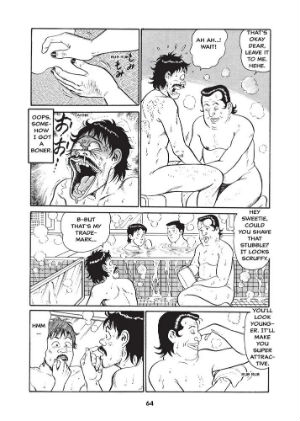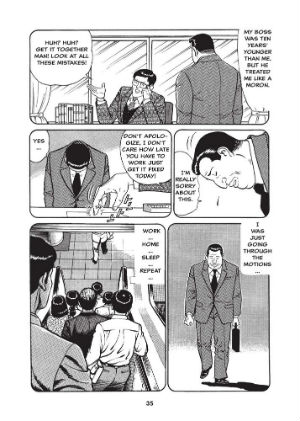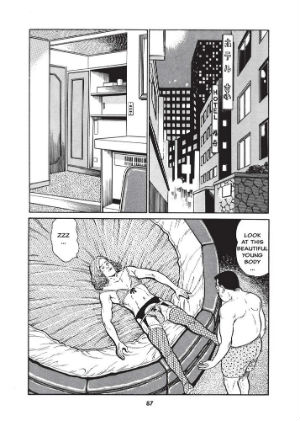 I admit to having been initially wary about the subject matter of Dokudami Tenement Vol. 3. Bearing the subtitle ‘Confessions of a Transgender (Killing Me Softly)’, and written and drawn by Takashi Fukutani – known in his time for pushing the boundaries of good taste with his ludicrous brand of humour – I feared the response that Dokudami’s straight, sex-crazed protagonist, Yoshio, might show towards transgender issues. This is, after all, the same manga that in a previous instalment entitled ‘The Fetishist’s Lament’ portrayed a social outcast making and drinking soup from women’s soiled underwear…
I admit to having been initially wary about the subject matter of Dokudami Tenement Vol. 3. Bearing the subtitle ‘Confessions of a Transgender (Killing Me Softly)’, and written and drawn by Takashi Fukutani – known in his time for pushing the boundaries of good taste with his ludicrous brand of humour – I feared the response that Dokudami’s straight, sex-crazed protagonist, Yoshio, might show towards transgender issues. This is, after all, the same manga that in a previous instalment entitled ‘The Fetishist’s Lament’ portrayed a social outcast making and drinking soup from women’s soiled underwear…
Yet I was reminded of how even that character, as shocking, scandalous, and grotesquely exaggerated as he may have been, was nevertheless considered through a loving lens, as Yoshio tried to make sense of his strange new friend and where he was coming from. I remembered how Fukutani, an artist so misunderstood in his short lifetime, determinedly applied his work to giving voice to the downtrodden. Within this context, maybe his examination of transgender issues in 1980s Tokyo, if not up to the standards of today’s discourses and terminologies, would not make for a tone-deaf mockery of trans people, but rather a surprisingly tender story of personal prejudices laid aside, and common ground discovered upon spending time in someone else’s shoes.
On opening to the volume’s inside cover, the reader is presented with a list of support organisations and helplines, and a note from the publishers: “Black Hook Press admires Takashi Fukutani for bringing such stories into the mainstream and raising awareness of the problems faced by marginalised individuals in Tokyo”. Enter transgender character Frank, or Frankie, whose apartment Yoshio wakes up in after an alcohol-fuelled night of which he has no recollection. After fantasising that he may have scored with a cute young cis girl while under the influence, the unexpected appearance of Frankie – with their imposing stature, full lips and painted fingernails – is a source of shock and horror on the part of Yoshio. True to Fukutani style, Yoshio’s physical reaction to this ‘reveal’ is not one of any subtlety, and is likely to cause offense. Yet rather than run, he nevertheless sticks around to find out more about his magnanimous host, who has not only saved him from a night of sleeping rough, but also fed him and washed his clothes. Though initially resistant to something he doesn’t understand, Yoshio embarks on a journey of discovery, guided by someone who does.
Frankie’s wardrobe of dresses, wigs and heels is at first presented as a release from the pressures of life as an office worker and breadwinner in Tokyo’s fast lane. ‘Cross-dressing’ is discussed in terms of a sub-cultural pursuit, practised within the confines of underground clubs and gay bars. Yet the more we hear from Frankie in their own words, the closer we get to arriving at a more up to date understanding of transgender issues, and the struggles of the trans experience. We see through the eyes of Yoshio how Frankie faces ridicule in the workplace and on the streets for simply trying to live without hiding their true self. We witness how they are denied entry to communal places; how they are rejected by their family, who deem them “just a pervert”, and their way of life “disgusting”; how the man they have fallen in love with is ashamed to be with them, wanting instead to pursue a more ‘socially acceptable’ partnership.
The reader is also continuously made aware of Frankie’s kindness and capacity for love, in the way they treat Yoshio, and in the patience they show towards a society that repeatedly puts them down and turns them away. Fukutani’s mastery of facial expressions, most often contorted into loud emotions of anger and alarm, finds a deeply affecting subtlety in Frankie’s wistful glances and dolefully down-turned mouth. In time, the outmoded discourse of Frankie’s first introduction makes way for a more progressive understanding: “[It’s] who I am now … totally”, they explain to Yoshio on his suggestion that Frankie live as a man in public, to give themselves an easier life. “I want to realign, and maybe even one day with science I can give birth”.
 The narrative turning point comes when Frankie encourages Yoshio to try on a dress and make-up. “Maybe it’ll change the way you look at things”, they suggest, and indeed, by literally stepping into their shoes, Yoshio learns what it’s like to inhabit Frankie’s vulnerable position within society. In one particularly disturbing sequence, new-look Yoshio becomes the victim of sexual violence. Fukutani pulls no punches in his depiction of Yoshio’s suffering, and the impact is visceral. Yoshio is drawn into feeling Frankie’s pain as a trans person in a bigoted world, along with the reader. Yet, somehow, the manga remains comedic at its heart, striking the sometimes uneasy balance between tragedy and laughter. While the prejudice faced by Frankie and the opinions of those who scorn them remain unchanged, they have made a friend in Yoshio, and found an empathetic ally in their fight for equality – presumably no mean feat in the 1980s.
The narrative turning point comes when Frankie encourages Yoshio to try on a dress and make-up. “Maybe it’ll change the way you look at things”, they suggest, and indeed, by literally stepping into their shoes, Yoshio learns what it’s like to inhabit Frankie’s vulnerable position within society. In one particularly disturbing sequence, new-look Yoshio becomes the victim of sexual violence. Fukutani pulls no punches in his depiction of Yoshio’s suffering, and the impact is visceral. Yoshio is drawn into feeling Frankie’s pain as a trans person in a bigoted world, along with the reader. Yet, somehow, the manga remains comedic at its heart, striking the sometimes uneasy balance between tragedy and laughter. While the prejudice faced by Frankie and the opinions of those who scorn them remain unchanged, they have made a friend in Yoshio, and found an empathetic ally in their fight for equality – presumably no mean feat in the 1980s.
‘Confessions of a Transgender’ is as unapologetic as Dokudami Tenement‘s previous instalments, and certainly doesn’t shy away from provocative territory. Yet I support Black Hook Press in believing Fukutani’s intentions to be pure. As elsewhere in his oeuvre, the outrageousness of his comedy gives voice to his moral outrage at the injustices faced by the economically, socially, and otherwise disenfranchised. For this reason, Takashi Fukutani should be heralded for bringing mainstream attention to subjects and attitudes that would not only have been bold and daring in their era, but which continue to require our attention today.
Takashi Fukutani (W/A) • Black Hook Press
Review by Ally Russell
















